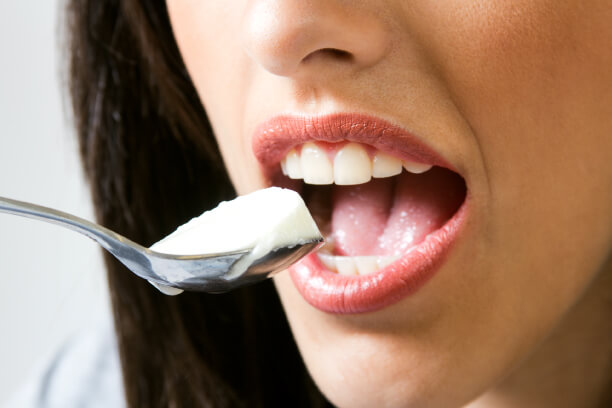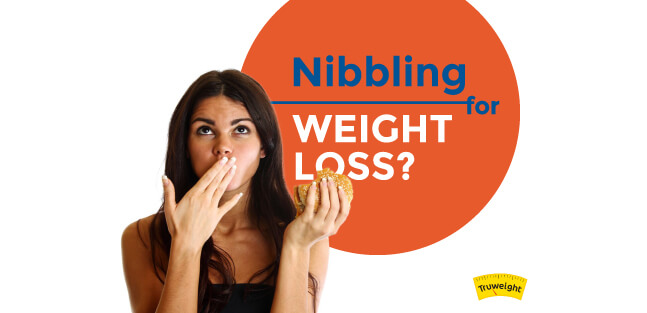Food & Nutrition, Health, Weight Loss
6 Reasons Why Your Dietitian Advices Nibbling Your Food For Weight Loss
Medical Reviewed by Ashwathy V. Pillai, Postgraduate Degree in Dietetics & Applied Nutrition
Your weight is an indicator of your health status. If you are overweight or obese, you are vulnerable to the potential health risks.
Healthy weight loss and its maintenance is the key to your well being and happy contented life.
Weight related health risks | What is BMI? | How to achieve weight loss? | What chewing food 32 times does? | Benefits of chewing food 32 times
Weight related health risks
Weighing above your ideal weight status can definitely land you to many of the health issues.
According to the study published in the American Journal of Clinical Nutrition, it has been suggested that high BMI along with a high value of waist circumference, is the predisposing factor for the emergence of many metabolic syndromes [1].
If you have BMI (Body Mass Index) of 25 to 29.9, you are overweight; if it is 30 and above, you will be categorized under obesity.
And with high body fat content and excess weight, the following health conditions are likely to occur-
- High blood pressure
- Cardiac disease
- Prone to suffer stroke
- Diabetes
- Osteoarthritis
- Back Pain
- Certain types of cancer
What is BMI?
It is a value derived from the weight and height of an individual.
According to the World Health Organization, BMI is defined as the person’s weight in kilograms divided by the square of the person’s height in meters (kg/m2).
The scale of BMI also gives an insight on the fat content in the body along with the degree of adiposity.
BMI scale, even today, is considered as one of the efficient indicators for knowing the prevalence of disease.
More is the BMI, more is the risk of developing diseases like cardiac related health issues, hypertension, insulin resistance, osteoarthritis and even, cancer [2].
Therefore, weight loss becomes important if you wish to achieve disease-free, active and healthy life ahead and always.
How to achieve weight loss?
The sure way to weight loss is through subtle changes in your diet, requisite physical activity regimen based on your age, adoption of healthy habits and lifestyle.
If you adhere to the following scrupulously, you are sure to experience positive results.
- Eat a lot of proteins as they form an important ingredient that speeds up your metabolism rate to burn calories while being nutrient rich.
- Drink a lot of water to detoxify your system and boost your metabolism by more than 20%.
- Avoid processed foods, added sugars, carbonated drinks, fats and excess of coffee to limit your intake of avoidable calories.
- Your diet should be fiber rich and contain lots of fruits and vegetables.
- Taking probiotics like curd, which is an important tool to maintain digestive health and a way to lose weight.
- Eat your food as slowly as possible as this is one of the most effective ways to lose weight. Slow eating is linked to more satiety value and reduced incidence of glucose intolerance and insulin resistance [3].
- Coupled with dietary support, one of the best ways to lose weight is by physical activity involving walking, jogging, swimming, cycling, exercises and yoga as a matter of routine.
- Ensure that you sleep well to maintain your body functions at an optimum level. Studies have shown that sleep-deprived individuals tend to be obese and invite other related potential health risks.
What chewing food 32 times does?
In your childhood days, you might remember your elders suggesting to eat slowly and chew your food properly. It is said that when you chew your food 32 times, you ensure consuming fewer calories.
Though 32 is the average number, hard foods may even take up to 40 times of chewing whereas soft foods may need 15-20 chews per mouthful.
Ayurveda has explained the science behind this process of 32 times chewing. Mouth is the first organ where the chewing takes place and process of digestion starts.
The main purpose of mastication or chewing is to reduce the food particle size and helps in its proper mixing with saliva [4].
Saliva contains digestive enzymes like Amylase and Lipase that simplify the carbs and fat respectively, present in the food.
Also, it helps in better nerve transmission, through taste buds, for signaling brain and preparing other digestive organs for proper secretion of acids and efficient digestion of the food.
Benefits of chewing food 32 times:
Chewing your food properly is the antithesis to fast eating.
People who eat fast without adequate chewing are more prone to be obese and are unable to lose weight easily.
Apart from the basic process of food ingestion and digestion, chewing your food properly has various other advantages.
The 6 reasons why your dietician advice nibbling your food for weight loss are:
1) Taste of food
You enjoy the taste of your food and all the flavors by chewing food adequately. This process is controlled by the complex association of nerves in taste receptors and that in the brain.
When food is eaten and chewed properly, it results in the better action of enzymes and efficient simplification.
This stimulus of taste is tracked by the taste receptors present in the taste buds, which reaches up to the brain with the help of cranial nerves [5]. This way we get to know about taste and its scrumptious pleasure.
2) Oral Health
When you chew your food properly and slowly, you are exercising the bones that hold your teeth.
Also, proper mixing with saliva washes away the bacteria found in the mouth. Thus, inhibiting the formation of plaque and tooth decay.
3) Exposure to enzymes and saliva

The saliva in your mouth is rich in digestive enzymes. The more you chew, the more is the surface area available to enzymes for breaking food down.
This, in turn, facilitates the process of digestion in your stomach and small intestine.
It further lubricates your food for smooth swallowing and passage through your gullet.
4) Eat slowly to eat less
When you chew your food properly, you are ensuring that you eat slowly.
Various studies have demonstrated the effect of slow eating on energy intake.
The release and reaction of certain hormones get enough time to reduce your appetite, feel full with a sense of satiety so that you stop eating. This, therefore ensure less calorie intake [6].
5) Digestion and absorption of food
Proper slow chewing liquefies your food with saliva and the process of digestion and absorption of nutrients becomes easier.
Also, the release of energy is hastened by the process with a positive impact on metabolism.
6) Sustain healthy weight
When you chew your food thoroughly, you slow down your eating and ultimately end up in eating less.
This ensures that you do not gain weight and in fact, also lose some weight in the long run.
Recent research presented by the Institute of Food Technologies at the Annual Meeting and Food Expo in Chicago in 2013, shows that people who are fast eaters tend to gain weight as compared to slow eaters [7].
Bottom Line
Chewing your food properly permits the gut hormones sufficient time to work on your feeling of satiety compelling you to eat less.
In fact, with a strong association between slow eating and reduced caloric intake providing good satiety value, it is a good way for healthy weight loss along with its healthy sustainability in the long run.
The first consultation is on us. Book your FREE CONSULTATION with a Possible Nutritionist!

wow i like it super nice
this link helped me alot
Hi Bsoom! Thank you and keep following our blog to know more health information.
Brilliant article, simple and effective tips, very well explained. But one thing to share along with this focus on diet also because diet plays an important role when losing fat.
Hi! We are glad to receive your feedback towards this article. Keep following our blog to know such more health information.
Great Article thanks you for this information
Hi! We thank you for sharing your feedback towards our article. Keep following our blog to know more health information.